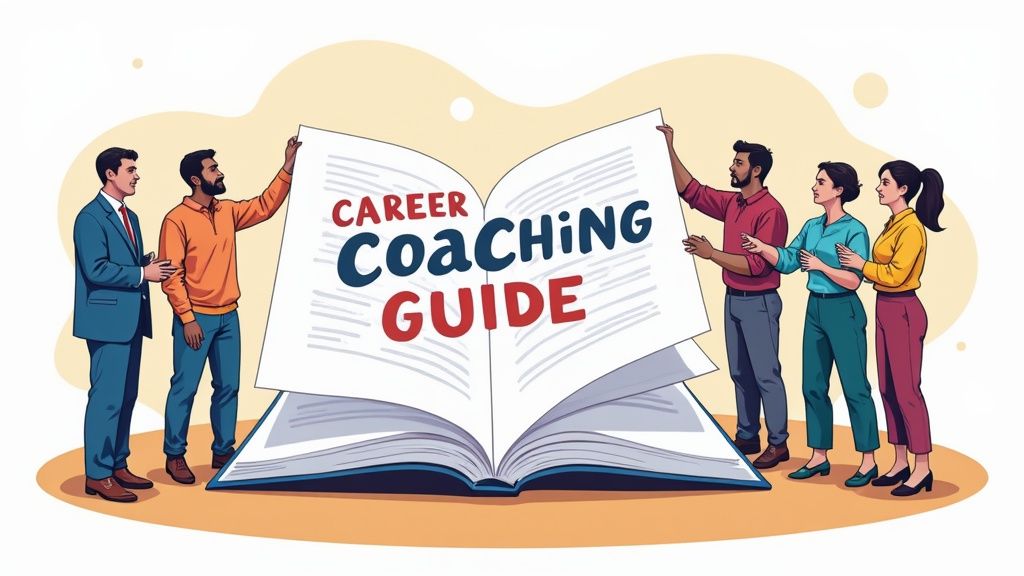10 Essential Career Coaching Tools That Drive Professional Success


Understanding The Impact of Career Coaching Tools

Career coaching tols play a vital role in proffesional developmnt by providing structre and directon. These tols help individuls map out their careeer path and achive their goals. Both coachs and clients benefit from understanding how these tols drive real results.
How Career Coaching Tools Facilitate Growth
The right tools help people gain deeper self-awareness and insight. Common examples like the Personal SWOT analysis and Career Wheel let clients identify their core strengths and areas for improvement. This self-knowledge forms the basis for setting achievable goals and making smart career choices. Vision exercises also help clients picture their ideal future and outline concrete steps to get there.
The Importance of Values Alignment
Values-focused tools like the Top 10 Values exercise and Work Values Identification help people understand what matters most in their work life. When personal values match professional goals, job satisfaction and wellbeing increase significantly. However, misalignment between values and work often leads to stress and burnout. Early detection of these gaps enables timely career adjustments.
Measuring the Impact of Coaching
Career coaching tools deliver measurable improvements across multiple areas. A recent Institute for Employment Studies (IES) case study of 2,002 UK primary care workers showed clear benefits. From October 2021 to March 2024, participants received personalized career coaching via video and phone. The results? Career planning and self-management skills improved notably - direction and clarity increased from 2.42 to 3.23 out of 5. Long-term benefits included reduced burnout and higher career satisfaction. Read the full study here. This data confirms that well-chosen coaching tools, combined with expert guidance, help people build rewarding careers and reach their full potential. The right tools provide essential insights and capabilities for effective career development.
Digital Assessment and Career Planning Platforms
Modern career coaching benefits greatly from purpose-built digital tools that help coaches deliver more precise and impactful guidance to their clients. These range from focused assessment tools to full-featured career planning systems that empower clients in their professional journey.
Assessment Tools for Revealing Client Potential
Professional assessment platforms offer coaches robust ways to understand their clients' core traits and capabilities. Using scientifically-validated tests like the Myers-Briggs Type Indicator (MBTI), these tools generate detailed reports on personality preferences, skills, and work style patterns. The insights help both coach and client identify natural strengths and growth opportunities.

Career Planning Platforms for Clear Direction
Today's career planning platforms serve as complete career development hubs. The Career Coach platform by Lightcast stands out by combining 32,000 career-relevant skills with extensive labor market data. This helps users discover viable career paths and learning opportunities. The platform even enables direct resume submission to employers.
Smart Integration of Digital Tools
Adding digital platforms to your coaching practice requires careful consideration. Choose tools that align naturally with your coaching style and client needs. Make sure clients feel comfortable with the technology and provide guidance when needed. Use platform insights to enhance, not replace, personalized coaching conversations.
Getting the Most from Digital Career Tools
Digital platforms offer clear advantages in career coaching. They handle routine tasks efficiently and provide data-driven insights that deepen coaching discussions. However, remember that technology supports rather than substitutes the essential human elements of coaching - empathy, active listening, and personalized guidance remain vital for creating lasting positive change in clients' careers.
The Evolution of Coaching Demographics and Methodologies

Career coaching continues to grow and change as client needs evolve. Coaches must adapt their methods and tools to serve different types of clients effectively. Understanding these changes helps coaches provide better support and guidance.
Adapting to a Changing Client Base
Today's coaching clients come from many different backgrounds, ages, and career stages. Each group has specific needs - for example, younger clients often prefer digital coaching tools, while senior professionals may value face-to-face meetings more. This variety creates both challenges and opportunities for coaches who need to be flexible in their approach.
A client's cultural background shapes their career goals and values significantly. To serve diverse clients well, coaches must develop strong cultural competency skills and adjust their coaching style accordingly.
Career stage also affects what type of coaching works best. New professionals typically want help exploring careers and building skills. Mid-career clients focus more on leadership growth and work-life balance. Late-career individuals often seek guidance on legacy planning and career transitions.
The Rise of Technology in Career Coaching
New tools have changed how coaches work with clients. Online tests, virtual coaching platforms, and AI tools provide fresh ways to deliver coaching services and reach more people. These advances help coaches work with clients more effectively.
The human connection remains essential even as technology grows. Core coaching skills like listening well, showing empathy, and building trust are still crucial. The UK Coaching Survey of more than 30,000 adults reveals key insights about coaching trends in 2024. Learn more about these findings here.
Blending Traditional Wisdom with Modern Approaches
The best coaches combine proven methods with new tools and techniques. They create hybrid coaching models that work for many different clients. This might mean using online assessments during regular coaching sessions or running group programs through video calls. The most helpful coaching tools are those that truly help clients reach their goals and grow.
Building Powerful Communication and Feedback Systems
Clear communication and insightful feedback are essential elements for successful career coaching. When structured well, these elements create meaningful coach-client relationships that drive real progress. The key is combining the right tools with communication approaches that truly connect.
Frameworks for Deeper Client Conversations
A supportive environment allows honest dialogue to flourish. Active listening techniques help coaches better understand clients by thoughtfully reflecting back what they hear. The solution-focused approach guides clients to find their own path forward by building on existing strengths. For example, coaches might ask "What strategies have already helped you make progress?"
Implementing Structured Feedback Systems
Regular check-ins keep clients focused and help refine their approach. Clear expectations and progress tracking tools create structure. Many coaches use weekly reflection forms or journaling to maintain momentum between sessions. This ongoing communication provides valuable insights for both parties. Thoughtful feedback delivered with care helps clients spot blind spots and build new capabilities.
Documentation and Client Engagement
Good session notes and progress tracking enhance the coaching experience and client outcomes. Writing down goals, action items and feedback creates natural accountability. When clients review past notes, it reinforces their commitment and growth. But documentation should be simple, not burdensome. Tools like brief summaries, progress trackers and shared docs make it efficient.
Navigating Difficult Conversations
Career coaching naturally involves discussing sensitive topics and setbacks. Having strategies for these conversations is crucial - like setting clear boundaries, communicating with empathy, and focusing on solutions. When clients face challenges, skilled coaches help them learn from the experience and build resilience. While sometimes uncomfortable, these conversations often lead to major breakthroughs. The trust built throughout coaching helps navigate tough moments productively. With strong communication and feedback systems in place, clients can confidently explore opportunities and reach their career goals.
Mastering Goal-Setting and Action Planning Tools

Setting clear goals and creating concrete action plans are essential building blocks of successful career coaching. These proven tools help clients map out their path forward and convert their aspirations into achievable steps. Let's explore how experienced coaches use these methods to guide their clients' growth.
Combining Frameworks for Personalized Roadmaps
Effective coaches know that each client needs a unique approach. They thoughtfully combine frameworks like SMART goals (Specific, Measurable, Achievable, Relevant, Time-bound) with methods such as backwards planning - starting with the end goal and working back to identify key milestones. This creates custom development plans that align with each client's specific situation and needs.
Selecting and Adapting Tools for Different Clients
Each client brings distinct needs that require different tools. For promotion-seeking clients, a performance development plan often works best. Career changers may benefit more from career exploration worksheets and values assessments to gain clarity. Great coaches carefully choose and modify these tools to match their clients' goals and learning preferences.
Overcoming Obstacles and Maintaining Momentum
The path to career goals often includes challenges. Self-doubt, procrastination, and life's surprises can slow progress. Smart coaches help clients stay on track using habit tracking and accountability partners. Regular check-ins and celebrating small victories help maintain motivation and engagement throughout the journey.
Turning Aspirations into Actionable Steps
Breaking down big goals into smaller steps is crucial but can feel daunting. Coaches guide this process using task breakdown charts and mind maps. These tools help transform major objectives into clear, doable actions. For example, "find a new job" becomes specific tasks like updating a resume, building industry connections, and practicing interviews. When coaches consistently apply these methods, they empower clients to take charge of their career growth and achieve lasting results.
Measuring and Maximizing Coaching Impact
Excellent career coaching requires careful measurement of progress and results to showcase its value. Having a structured approach to tracking client growth and documenting outcomes helps demonstrate the tangible benefits of coaching to all stakeholders.
Selecting Meaningful Metrics
Choosing the right metrics is essential for mapping a client's career development journey. The best metrics reflect each client's unique goals and circumstances. For instance, measuring leadership development might involve tracking projects completed, team feedback scores, or key initiative launches. When metrics align with goals, they transform abstract progress into clear data points that show real growth.
Implementing Tracking Systems
Creating an effective system to monitor progress is crucial. Simple tools like spreadsheets can work well, as can specialized coaching software platforms. Regular check-ins provide valuable data points and help coaches support clients effectively. Like monitoring vital signs, consistent tracking reveals where clients are succeeding and where they need extra guidance.
Using Data to Improve Coaching Practices
The information gathered through tracking does more than just show results - it provides key insights to enhance coaching methods. By examining patterns in client outcomes, coaches can identify their most successful approaches for different situations and client types. For example, if data shows clients using specific goal-setting templates achieve better results, coaches can apply those tools more broadly. This evidence-based refinement leads to better coaching outcomes.
Building a Comprehensive Evaluation Framework
A complete evaluation framework brings together metrics, tracking, and analysis to demonstrate coaching value and guide improvements. The framework should:
Measure meaningful progress indicators
Track outcomes systematically
Analyze results to identify what works
Show clear evidence of client growth
Guide ongoing coaching refinements
Want to take your coaching practice to the next level with data-driven methods? Coaching Hub offers tools and resources to help you measure and maximize your coaching impact. Visit today to start strengthening your evaluation approach.